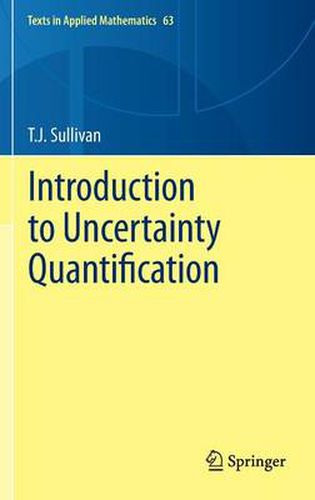Readings Newsletter
Become a Readings Member to make your shopping experience even easier.
Sign in or sign up for free!
You’re not far away from qualifying for FREE standard shipping within Australia
You’ve qualified for FREE standard shipping within Australia
The cart is loading…






This title is printed to order. This book may have been self-published. If so, we cannot guarantee the quality of the content. In the main most books will have gone through the editing process however some may not. We therefore suggest that you be aware of this before ordering this book. If in doubt check either the author or publisher’s details as we are unable to accept any returns unless they are faulty. Please contact us if you have any questions.
This text provides a framework in which the main objectives of the field of uncertainty quantification (UQ) are defined and an overview of the range of mathematical methods by which they can be achieved. Complete with exercises throughout, the book will equip readers with both theoretical understanding and practical experience of the key mathematical and algorithmic tools underlying the treatment of uncertainty in modern applied mathematics. Students and readers alike are encouraged to apply the mathematical methods discussed in this book to their own favorite problems to understand their strengths and weaknesses, also making the text suitable for a self-study.
Uncertainty quantification is a topic of increasing practical importance at the intersection of applied mathematics, statistics, computation and numerous application areas in science and engineering. This text is designed as an introduction to UQ for senior undergraduate and graduate students with a mathematical or statistical background and also for researchers from the mathematical sciences or from applications areas who are interested in the field.
T. J. Sullivan was Warwick Zeeman Lecturer at the Mathematics Institute of the University of Warwick, United Kingdom, from 2012 to 2015. Since 2015, he is Junior Professor of Applied Mathematics at the Free University of Berlin, Germany, with specialism in Uncertainty and Risk Quantification.
$9.00 standard shipping within Australia
FREE standard shipping within Australia for orders over $100.00
Express & International shipping calculated at checkout
This title is printed to order. This book may have been self-published. If so, we cannot guarantee the quality of the content. In the main most books will have gone through the editing process however some may not. We therefore suggest that you be aware of this before ordering this book. If in doubt check either the author or publisher’s details as we are unable to accept any returns unless they are faulty. Please contact us if you have any questions.
This text provides a framework in which the main objectives of the field of uncertainty quantification (UQ) are defined and an overview of the range of mathematical methods by which they can be achieved. Complete with exercises throughout, the book will equip readers with both theoretical understanding and practical experience of the key mathematical and algorithmic tools underlying the treatment of uncertainty in modern applied mathematics. Students and readers alike are encouraged to apply the mathematical methods discussed in this book to their own favorite problems to understand their strengths and weaknesses, also making the text suitable for a self-study.
Uncertainty quantification is a topic of increasing practical importance at the intersection of applied mathematics, statistics, computation and numerous application areas in science and engineering. This text is designed as an introduction to UQ for senior undergraduate and graduate students with a mathematical or statistical background and also for researchers from the mathematical sciences or from applications areas who are interested in the field.
T. J. Sullivan was Warwick Zeeman Lecturer at the Mathematics Institute of the University of Warwick, United Kingdom, from 2012 to 2015. Since 2015, he is Junior Professor of Applied Mathematics at the Free University of Berlin, Germany, with specialism in Uncertainty and Risk Quantification.